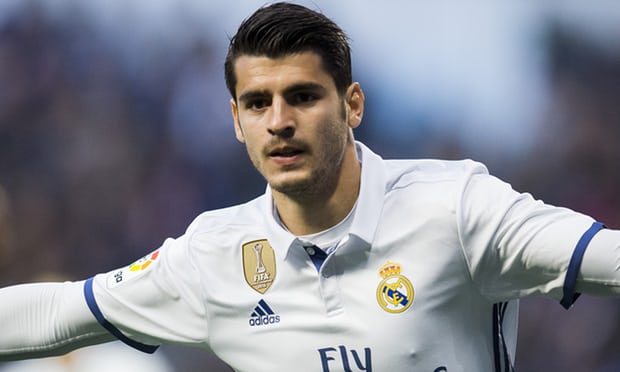Of the players who scored 10 goals or more in La Liga last season, none did so with a better conversion rate than Álvaro Morata. His 55 shots yielded 15 goals, which is one of the reasons he began the summer ranked alongside Kylian Mbappé, Romelu Lukaku and Andrea Belotti as one of the four most eligible young strikers in Europe. Chelsea, having failed to land Lukaku (or refused to pay over the odds for him, depending whose account you prefer), pretty much had to sign one of the other three to replace Diego Costa, who will almost certainly join Atlético Madrid at some point in the next six weeks.
Morata is clearly hugely gifted. He is decent in the air, mobile and looks the part. He impressed at Juventus as well as Real Madrid, which should offer encouragement about his capacity to thrive in different environments against varying styles of defending. He has played in three of the past four Champions League finals, scoring in one of them. At 24, he is used to the rhythms and pressures of playing for an elite club.
And yet there must be concerns. Perhaps in the modern world £58m is a reasonable price – Lukaku, who cost around 25% more, has never scored in the Champions League – but this is a player who has never started more than 16 league games in a season. His role, certainly at Madrid, was largely to come off the bench to pick off tired opponents. Nine of his 17 goals in La Liga and the Champions League last season came after the hour. That is not to say he cannot score important goals – after all, in 2014‑15, he registered twice against Borussia Dortmund, twice against Madrid and against Barcelona in the knockout stages of the Champions League – but it is to say that he rarely had the opportunity to do that for Madrid, and certainly never had the pressure of being expected to do that.
A quick scan of the stats from last season suggests he had fewer shots per game, won fewer aerials, made fewer key passes and dribbled less often than Costa but the disparity in style of play, opposition and role in the side makes such comparison all but meaningless.
More fundamental is the fact that Morata is just not Costa. He does not exist in the same fug of fury, raging perpetually against sleights real and, more often than not, imagined or exaggerated. He does not wage a one-man war on the opposition and the referee. He will not antagonise his marker just by looking at him. He will not lurch about, in a metaphorical cloak and top hat, like an Edwardian villain seeking an innocent maiden to bind to the railway tracks. He will not playwith the same snarl and/or simper, needling and wheedling, prising the slightest chink of opportunity into a bona fide chance.Morata does not have the same capacity to magic a goal from nowhere, by inspiration or aggravation, that Costa does. The Brazilian’s late goal at Stamford Bridge against West Bromwich Albion last December was typical as he chased what seemed a lost cause to force an error from a defence that had been all but impeccable before finishing classily. He also got the only goal in away games against Middlesbrough and Crystal Palace, the late winners against West Ham United and Watford, and a late equaliser at Swansea City, as well as opening the scoring against Leicester City, Hull City and at home against Middlesbrough.
It is not only that Costa scored 20 goals last season, it is that nine of them were goals that had a decisive impact on the game – and that was in a season in which his form dipped significantly after Christmas as he began to eye the exit. Certain players have a quality of winningness, a capacity to take the tide at the flood that leads on to fortune, and that in turn imbues a whole side with confidence and decisiveness. That is hard to quantify but nobody, surely, would deny that Costa, when motivated, made Chelsea a tougher, more ruthless team.
The problem is he is also moody. Conte just about got enough out of him in the second half of last season but José Mourinho certainly did not in the first half of the previous campaign. Morata will not be so turbulent. He has patiently waited for his chance, his frustration at never being a regular showing only occasionally, acting as professionally as could reasonably be expected.
Morata has looked for two or three years as though he was just waiting for the opportunity to explode. This is that chance. He has all the technical attributes to be a success in Conte’s system: the questions now are whether he can cope with the pressures of being the No1 striker and whether he can find a way of replicating the edge Costa gave Chelsea.














